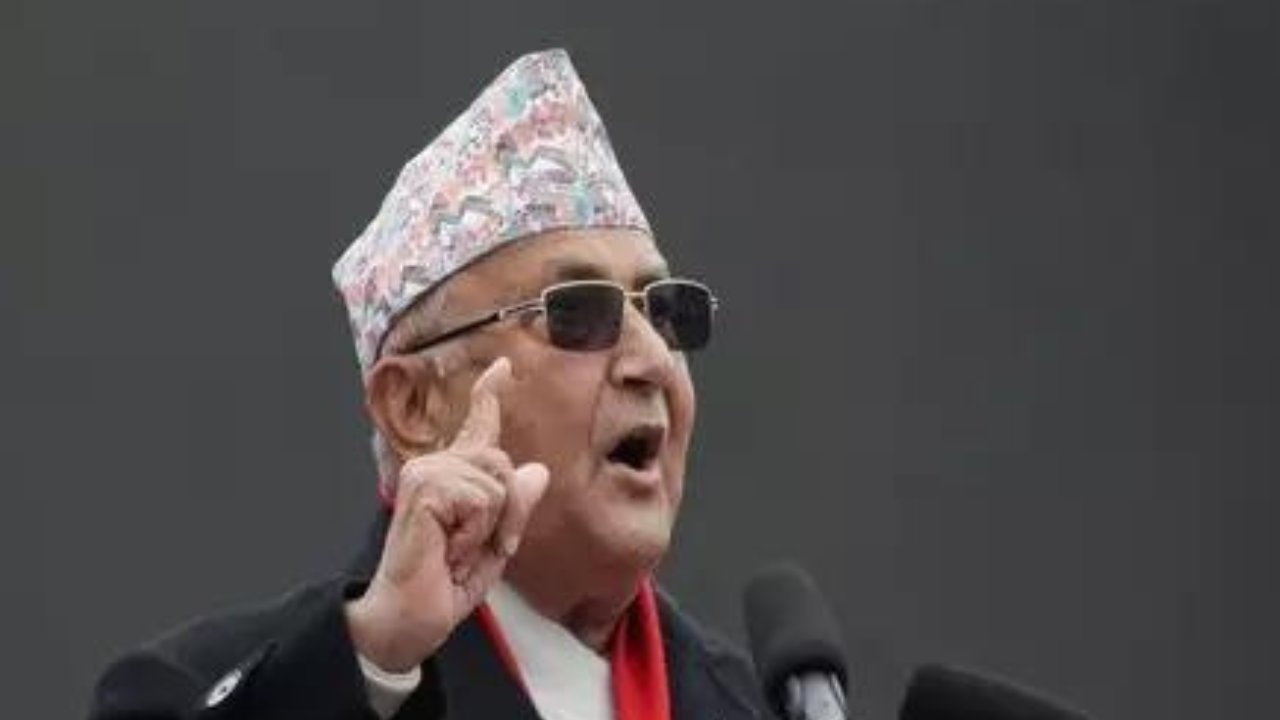KP Sharma Oli to be Nepal’s next prime minister? Congress, CPN-UML reach overnight agreement to form new coalition
July 2, 2024

In a surprising political turning point, the Nepali Congress and the Communist Party of Nepal (United Marxist-Leninist) (CPN-UML) agreed to form a new coalition government.
This agreement between Congress President Sher Bahadur Deuba and UML leader KP Sharma Oli stipulates that Oli will be the Prime Minister for the next one and a half years, followed by Deuba for the remaining term until the next election. This development is expected to lead to the fall of the government formed on March 4 under Pushpa Kamal Dahal alias Prachanda; an official announcement is expected soon.
The agreement signed overnight allows KP Sharma Oli to lead the government initially, while Deuba will take over after one and a half years. The formal announcement of this new alliance is expected soon. “An agreement to form a new government was signed overnight between Nepali Congress leader Sher Bahadur Deuba and UML leader KP Sharma Oli. According to this, Oli will lead the government for the next one and a half years and Deuba will lead the remaining period until the elections in three years,” a senior Nepali Congress leader present at the meeting told news agency ANI.
The two parties also agreed on the division of ministries. According to a UML leader, the party that will lead the government will not get the home ministry. Apart from the central government, the two parties also agreed on the division of leadership in the different provinces. The CPN-UML will lead the governments in Koshi, Lumbini and Karnali provinces while the Congress will lead Bagmati, Gandaki and Far-Western provinces. The Madhesh-based parties will lead the government in Madhesh province. The UML leader confirmed, “The party that will lead the government will not get the home ministry, that is agreed. Apart from the Union government, the CPN-UML will form a government in Koshi, Lumbini and Karnali provinces while the Congress will lead Bagmati, Gandaki and Far-Western provinces. The Madhesh-based parties will lead the government in Madhesh province, that is agreed by the two leaders.”
In addition, the new alliance has set up a committee to propose changes in the electoral process and the constitution. The committee is chaired by former Chief Justice Kalyan Shrestha. The largest and second largest parties in Parliament have also worked out an agreement to amend the constitution, which provides for the Vice President to be appointed as the Speaker of the National Assembly.
Before the signing, representatives of the Congress and UML informed President Ram Chandra Paudel about the coalition change. During their meeting, the representatives informed the President about the activation of Section 76 (2) to form a new government if incumbent Prime Minister Prachanda did not hold a vote of confidence after the withdrawal of the UML.
Prachanda, who came to power after the 2022 general elections and has already contested four terms in parliament, must now seek a new vote of confidence. There was no immediate reaction from the Maoist central government led by Prachanda to the coalition change. However, during the cabinet meeting on Monday, Dahal assured ministers that the current alliance would remain intact.
Communications and Information Technology Minister Rekha Sharma quoted Dahal as saying, “The media reports are just rumours. We are still in dialogue with our coalition partners.” “The Prime Minister has informed us about the internal situation and dismissed external rumours. There are concerns about what will happen with this government, but there will be no changes. Some want this coalition to be short-lived, but we are determined to keep this government stable for a long time,” she added.
On March 4, Prachanda had already renewed a coalition with the CPN-UML, surprising the largest coalition partner, the Nepali Congress. Initially, a new coalition was formed consisting of the CPN-UML, the CPN-Maoist Center, the Rastriya Swatantra Party and the Janata Samajwadi Party. However, the Nepali Congress formally withdrew its support the following day and invoked Article 100, subsection (2). According to this article, a prime minister must meet the 50 percent threshold, which, given the current number of parliamentarians, corresponds to 138 votes.
As a result of the coalition split, the Janata Samajbadi Party Nepal also left the government and joined the opposition. Pushpa Kamal Dahal came to power in December 2022 by joining forces with arch-rival CPN-UML, after previously forming an alliance with the Nepali Congress for the November 2022 elections.
In the confidence vote on January 10, 2023, Dahal received widespread support. 268 of the 270 parliamentarians present voted in favor, which is the highest percentage in the known history of the Nepali Parliament since the establishment of democracy. However, within three months, Dahal joined hands with the Nepali Congress and secured a majority in the confidence vote on March 20, 2023. In this second vote, Dahal received 172 votes out of 262 MPs present, 89 votes were against him while one abstained.
This agreement between Congress President Sher Bahadur Deuba and UML leader KP Sharma Oli stipulates that Oli will be the Prime Minister for the next one and a half years, followed by Deuba for the remaining term until the next election. This development is expected to lead to the fall of the government formed on March 4 under Pushpa Kamal Dahal alias Prachanda; an official announcement is expected soon.
The agreement signed overnight allows KP Sharma Oli to lead the government initially, while Deuba will take over after one and a half years. The formal announcement of this new alliance is expected soon. “An agreement to form a new government was signed overnight between Nepali Congress leader Sher Bahadur Deuba and UML leader KP Sharma Oli. According to this, Oli will lead the government for the next one and a half years and Deuba will lead the remaining period until the elections in three years,” a senior Nepali Congress leader present at the meeting told news agency ANI.
The two parties also agreed on the division of ministries. According to a UML leader, the party that will lead the government will not get the home ministry. Apart from the central government, the two parties also agreed on the division of leadership in the different provinces. The CPN-UML will lead the governments in Koshi, Lumbini and Karnali provinces while the Congress will lead Bagmati, Gandaki and Far-Western provinces. The Madhesh-based parties will lead the government in Madhesh province. The UML leader confirmed, “The party that will lead the government will not get the home ministry, that is agreed. Apart from the Union government, the CPN-UML will form a government in Koshi, Lumbini and Karnali provinces while the Congress will lead Bagmati, Gandaki and Far-Western provinces. The Madhesh-based parties will lead the government in Madhesh province, that is agreed by the two leaders.”
In addition, the new alliance has set up a committee to propose changes in the electoral process and the constitution. The committee is chaired by former Chief Justice Kalyan Shrestha. The largest and second largest parties in Parliament have also worked out an agreement to amend the constitution, which provides for the Vice President to be appointed as the Speaker of the National Assembly.
Before the signing, representatives of the Congress and UML informed President Ram Chandra Paudel about the coalition change. During their meeting, the representatives informed the President about the activation of Section 76 (2) to form a new government if incumbent Prime Minister Prachanda did not hold a vote of confidence after the withdrawal of the UML.
Prachanda, who came to power after the 2022 general elections and has already contested four terms in parliament, must now seek a new vote of confidence. There was no immediate reaction from the Maoist central government led by Prachanda to the coalition change. However, during the cabinet meeting on Monday, Dahal assured ministers that the current alliance would remain intact.
Communications and Information Technology Minister Rekha Sharma quoted Dahal as saying, “The media reports are just rumours. We are still in dialogue with our coalition partners.” “The Prime Minister has informed us about the internal situation and dismissed external rumours. There are concerns about what will happen with this government, but there will be no changes. Some want this coalition to be short-lived, but we are determined to keep this government stable for a long time,” she added.
On March 4, Prachanda had already renewed a coalition with the CPN-UML, surprising the largest coalition partner, the Nepali Congress. Initially, a new coalition was formed consisting of the CPN-UML, the CPN-Maoist Center, the Rastriya Swatantra Party and the Janata Samajwadi Party. However, the Nepali Congress formally withdrew its support the following day and invoked Article 100, subsection (2). According to this article, a prime minister must meet the 50 percent threshold, which, given the current number of parliamentarians, corresponds to 138 votes.
As a result of the coalition split, the Janata Samajbadi Party Nepal also left the government and joined the opposition. Pushpa Kamal Dahal came to power in December 2022 by joining forces with arch-rival CPN-UML, after previously forming an alliance with the Nepali Congress for the November 2022 elections.
In the confidence vote on January 10, 2023, Dahal received widespread support. 268 of the 270 parliamentarians present voted in favor, which is the highest percentage in the known history of the Nepali Parliament since the establishment of democracy. However, within three months, Dahal joined hands with the Nepali Congress and secured a majority in the confidence vote on March 20, 2023. In this second vote, Dahal received 172 votes out of 262 MPs present, 89 votes were against him while one abstained.



